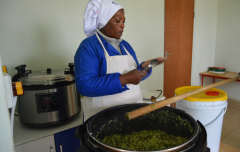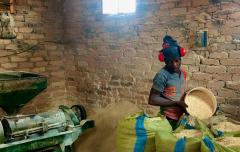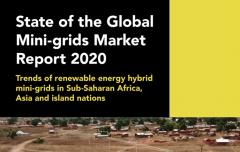JUMEME’s unique mini-grid model gains traction in Tanzania
A Tanzanian solar mini-grid company, JUMEME, believes it has found a winning business model that meets the twin objective of scalable financing to build their systems and achieving broad community-wide support to operate and pay for them. It has a successful pilot project up and running on an island in Lake Victoria to prove it.
With new grant financing from the Tanzanian government and the European Union, adding to the contributions of JUMEME’s private investors INENSUS, TerraProjects, St. Augustine University of Tanzania and RP Global, the rural power company is now installing 11 solar mini-grids that are expected to power 20 island villages by the end of 2018. Its long-term goal is to build several hundred mini-grids, all in remote rural areas of Tanzania where electric grid service is not available.
Advances like this are critical if mini-grids – small localized power plants and distribution lines that can power homes and businesses – are to realize their enormous promise in providing clean reliable energy for people living without electricity. The potential for solar-powered mini-grids is especially tantalizing; recent IEA research says it is lowest-cost technology for providing power to 450 million people living without electricity globally, two-thirds of whom live in remote, rural parts of Sub-Saharan Africa.
JUMEME executives say its secret sauce is painstaking community engagement to encourage and maximize productive uses of the electricity, thus enabling deeper social impacts, including education, food security, job creation and women’s entrepreneurship. This approach fosters a close relationship between the community and the mini-grid company, which is the basis for a new business concept called the KeyMaker Model.
Under the KeyMaker Model, the mini-grid company joins hands with the village community to exploit and market local natural resources for the benefit of all partners. The partners utilize the availability of reliable electricity and management competences which the mini-grid company takes to rural areas to create the synergies required to offer competitive products. The mini-grid is the key to access these resources; the mini-grid operator is the KeyMaker.
In JUMEME’s pilot project on Ukara Island in Lake Victoria, the KeyMaker Model is structured around the natural resource of fresh tilapia, a popular fish in the fast growing Tanzanian middle class. The company collects tilapia from local fishermen, freezes it on-site using its own electricity and delivers it straight to the capital of Tanzania, Dar es Salaam. This way, JUMEME not only ranks among the highest quality and freshest tilapia suppliers in the capital, but can also pay higher purchase prices to the fishermen than anybody else while making a margin that makes the combined mini-grid and fish business an attractive investment.
By nurturing and directly involving themselves in these economic opportunities in advance, JUMEME can tailor each hybrid mini-grid system to support locally-identified power needs, ranging from the machines required for KeyMaker activities, up to productive use machines and appliances like water irrigation pumps, large motors for mills and bakery ovens.
Such a model brings along considerable complexity that needs to be managed. “We have achieved a high degree of automation in our operations, starting with remote power system monitoring, mobile money integration for pay-as-you-go (PAYG) services, automated communication with customers and a service ticketing system integrated with the call center software. All of that has been developed by JUMEME and its shareholders over the past few years and it is now helping us become more and more efficient.” said Nico Peterschmidt, JUMEME’s Director of Technology and Operations.
JUMEME’s pay-as-you-go model allows customers to recharge their meters by mobile phone at any time with any amount. It also balances demand and supply by using time-of-use tariffs and activates pumping loads during times of excess solar power.
JUMEME’s more hands-on approach is different from other mini-grid company strategies, who use what is often called the A-B-C Model, which focus in the early stages on securing large anchor clients, and only later on broader business and community support after the mini-grid is built. JUMEME believe that these strategies sometimes fail due to lack of local business development and community support, which is critical for generating the necessary electric sales revenues to cover utility costs.
The company’s first pilot project is a 95-kilowatt hybrid power station installed in the village of Bwisya on the island of Ukara, which is now serving 1,500 inhabitants. The project has led to growth of existing businesses and creation of new ones including tilapia-based fish farming operations and local ice production; irrigation for cultivation of ‘cash crops’ such as millet and sunflowers; and women-led businesses such as hair salons and fruit drink stands.
The new mini-grids that are being built will achieve an additional 5,000 connections for households, businesses and public buildings, including schools and health centers by early 2019. These facilities have long relied on more polluting, expensive forms of energy, such as kerosene and diesel, or had no electricity at all.
The company’s longer-term plan is to expand its mini-grid business to the mainland, leading to 8,000 additional connections. Within the coming years it hopes to scale to 300 mini-grids that will provide power to one million people in Tanzania’s rural areas.
All of these projects are being built in remote areas where the government has no immediate plans to expand electric grid service. JUMEME spokesperson Emmeline Hess explained “Project development is one of our core competencies and it not only includes site selection but also close cooperation with the government. Any action we take is closely coordinated with the relevant authorities. If one day the grid comes, we have models in place preparing us for this scenario,”
JUMEME is preparing to secure more private investments and debt financing for a larger mini-grid roll-out. However, the current proof-of-concept stage still requires a significant grant portion, provided by the European Union, Tanzania’s Rural Energy Agency, as well as the African Development Bank’s Sustainable Energy Fund, GIZ and EEP.
“Access to energy is a critical element to empower people, especially women and youth,” said Jose Correia Nunes, EU Head of Cooperation, which has provided 46 percent of the total financing for JUMEME. “Ensuring affordable, reliable clean and modern energy is a key area of European Union engagement with the Tanzanian government and the private sector.”




